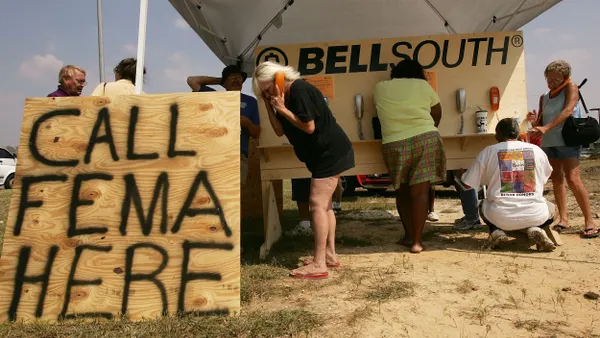Dive Brief:
- In a push to combat climate change, Los Angeles Councilmen Mike Bonin and Paul Kortez presented a written proposal on Friday calling for a private meeting with City Attorney Mike Feuer to discuss "options for filing claims against the corporations that have profited from the production and sale of fossil fuels."
- This call for legal action immediately follows New York Mayor Bill de Blasio's announcement that the city would divest its pension funds from fossil fuel companies and sue five major oil companies — BP, Chevron, ConocoPhillips, Exxon Mobil and Royal Dutch Shell — for their impact on global warming. The Los Angeles motion also calls for the city to prepare and file an amicus brief to assist New York in its legal actions.
- "By knowing that their business practice was contributing to climate change and doing nothing to stop their destructive ways, the oil and gas industry should be held liable for the current and future damage climate change is causing our city," reads the motion. The city and its surrounding communities have recently fallen victim to devastating wildfires and mudslides, which Bonin called "the implication of climate change."
Dive Insight:
Prior to New York's announcement, a number of California cities — including San Francisco and Oakland — took action against major oil companies, citing rising seal levels and other weather-related changes as a result of oil and gas production. The complaint filed by San Francisco City Attorney Dennis Herrera explains that the city must "improve, protect, move and build infrastructure to adapt now to past and ongoing sea level rise," noting that long-term upgrades to the city's seawall will cost approximately $5 billion.
The Los Angeles area is facing a long road of expensive repairs and preparations, as well. A number of wildfires, including the Skirball Fire, burned hundreds of acres, damaged city structures and forced residents out of their homes in December. Just up the coast in Montecito, at least 20 people lost their lives to a deadly mudslide last week. Due to the traumatic loss these cities — and a number of communities across California — have experienced in the past year, it is crucial for officials to invest in resiliency strategies to prevent damages and fatalities in the future.
Seeking financial recompense from petroleum companies is just one tactic, and will likely be used by other cities as this trend picks up. Some in the media have gone so far as to call this action a "movement," while others are calling on cities like New York to pay less attention to climate change and more attention to matters such as faulty infrastructure.
The movement to hold fossil fuel companies financially responsible for their role in climate change just scored a major ally: New York Cityhttps://t.co/RpkuDHwvrS
— Natasha Geiling (@ngeiling) January 10, 2018
FT View: If New York City really wants to fight climate change officials should fix its crumbling infrastructure https://t.co/OTjftwZ5OI
— Financial Times (@FinancialTimes) January 12, 2018
The success of these suits, however, is to be seen. Oil companies are quick to defend their business model — ExxonMonbil called state-led efforts to investigate the company's ties to climate change "an unlawful conspiracy," according to The New York Times — and similar suits that were filed against the fossil fuel industry in the past have not been successful.










